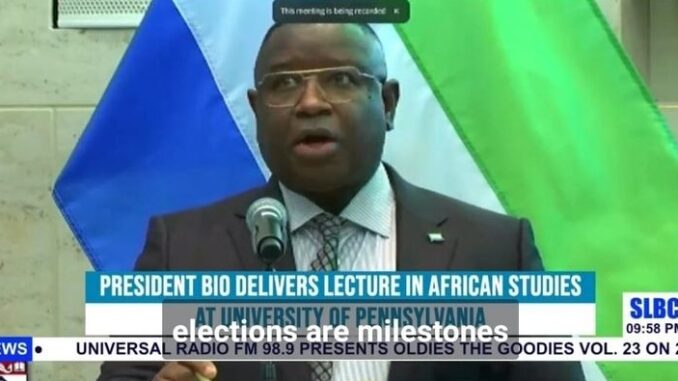
President Larry Jameson, Provost John Jackson, Jr, Staff and Students of the great University of Pennsylvania, Distinguished Ladies and Gentlemen, Good Afternoon.
I bring you very warm greetings and sunshine from my beautiful country, Sierra Leone, the Land That We Love.
As we gather to discuss the future of democracy, progressive politics, and inclusive development in Africa and Sierra Leone, we find ourselves at a critical juncture in history.
Our world faces interconnected crises that challenge the very foundations of our societies. The war in Ukraine has escalated energy and food prices to unprecedented levels, igniting a global cost-of-living crisis that has spurred social unrest across continents.
Amid these global upheavals, the demand for food, water and energy is escalating, fueled by population growth and socio-economic progress.

These global challenges place an immense strain on the democracies of nations, Sierra Leone included. Democracies worldwide are being tested as they strive to address these multifaceted crises, safeguarding the well-being of their citizens while maintaining the principles of freedom, equity and justice.
In Sierra Leone, this backdrop of global turmoil intersects with our unique journey towards democracy. Democracy, in essence, is akin to a muscle that requires constant exercise to remain robust and resilient.
Democracy thrives on engagement, transparency, and the rule of law, and like any muscle, if neglected, it risks atrophy, leaving societies vulnerable to the forces of autocracy and despotism.
Emerging from the shadows of colonialism and the ravages of a bloody civil war, Sierra Leone has embarked on a remarkable journey towards a vibrant democracy, breathing life into the freedoms that form the essence of our national identity.
Our democracy’s vitality is anchored in its ability to withstand both domestic tribulations and the unpredictable forces of a changing world, compelling us to uphold our foundational principles steadfastly.
LADIES AND GENTLEMEN, our challenges, both global and local, require leadership that is adaptable, transparent, and deeply committed to justice and equality. The inspirational leadership of the late Nelson Mandela demonstrated how progressive politics could unite a nation and drive forward social progress.
Mandela’s intentional embrace of the Springbok emblem during the 1995 Rugby World Cup emerged as a powerful symbol of unity, showcasing the capacity of visionary leadership to bridge divides and foster a collective spirit of hope and resilience.
Mandela’s enduring influence reminds us that the essence of progressive politics lies beyond mere ideological confines, advocating for governance grounded in values that integrate socio-economic development, environmental conservation, fairness, and active citizen engagement.
In Sierra Leone, our dedication to these principles is manifested in our journey from the depths of colonialism and conflict to a renaissance of democratic governance and significant societal transformation.
What is true for Sierra Leone is also true for my personal journey as a Soldier, Politician and Statesman.
In reflecting upon this trajectory from military intervention to staunch advocacy for democracy, some legitimate questions arise: What has changed? How can I, a leader once engaged in what you can describe today as an unconstitutional change of government, stand at the vanguard against coups today?
This query merits a thoughtful exploration, for it touches upon the heart of our collective evolution as a continent and as proponents of democratic governance.
My involvement in the 1992 military intervention, which aimed to dismantle an entrenched twenty-year autocracy and pave the way for democratic rule, reflects a complex yet necessary chapter in our nation’s history.
I was also involved in the military “palace coup” in January 1996 and upheld our promise of returning the country to civilian rule. Subsequently, I organised democratic elections and relinquished power within three months.
This was a testament to my unwavering dedication to the principles of democracy and the rule of law. Such actions, though fraught with challenges, highlight the significance of leadership that prioritises the collective aspirations of its people over personal ambition.
Choosing to relinquish power, especially as a young leader who could have justified holding onto power, was not merely a personal decision but a declaration of my commitment to democratic governance.
My role in the peace mediation between the Government of Sierra Leone and the Revolutionary United Front rebels was not merely a diplomatic endeavour but a profound commitment to the peace and unity of our nation.
This pivotal moment in our history served as the bedrock for the enduring peace we enjoy today, earning me the honour of being referred to as the “Father of Democracy” in Sierra Leone.
The organisation of the first multi-party general elections after two decades marked a significant milestone, transitioning Sierra Leone from the grip of an autocratic regime to the dawn of democratic governance.
It represented a pivotal moment, not just for me but for Sierra Leone and, by extension, Africa — a testament to the belief that true leadership is defined not by the accumulation of power but by the legacy of empowerment it leaves behind.
The echoes of our past must not be allowed to justify the actions of our present nor determine the trajectory of our future. The old ways of autocratic rule are incompatible with the aspirations of our people and the exigencies of our times.
The allure of reverting to undemocratic practices in the face of adversity is a path fraught with peril — a regression to a state we have collectively vowed to transcend. We cannot embrace the very practices we have strived to overcome.
LADIES AND GENTLEMEN, Africa has indeed come of age. The challenges we face today — be it scarcity of resources, climate change, or the complexities of governing increasingly multicultural and diverse societies — demand a governance model that is inclusive, participatory and adaptive.
In Sierra Leone, our commitment to democracy is not merely rhetorical but is manifested in our actions, policies, and the institutional frameworks we establish. It is a commitment to a future where the will of the people is the cornerstone of governance, where dialogue supersedes decree, and where the rule of law prevails over the rule by force.
My Government’s abolition of sedition laws, the protection of journalistic freedom, and the conduct of peaceful elections are milestones that reflect our dedication to building a society where dialogue, transparency, and accountability are the cornerstones of governance.
As we forge ahead, the principles of progressive politics will continue to guide our efforts to create a Sierra Leone that is resilient in the face of global challenges, equitable in its distribution of resources, and unwavering in its commitment to democracy.
LADIES AND GENTLEMEN, the political and constitutional crises that have beset the ECOWAS sub-region in recent years underscore a pressing challenge to the stability and prosperity of our nations.
The complicated emergence of unconstitutional governments — spawned by a confluence of social discontent, economic hardship, and a crisis of legitimacy — poses a grave threat to the democratic fabric we have strived to weave.
These challenges call into question the effectiveness of ECOWAS as a regional body in its crucial role as a mediator and guardian of democratic principles.
I remain committed to the difficult and necessary task of making sure that this body becomes more relevant and effective in upholding and strengthening democracy and call upon fellow leaders to do the same.
In an age where technology and social media have revolutionised the dissemination of information and mobilised citizens to demand transparency and accountability, our resolve to uphold democratic ideals has never been stronger.
I must emphasise here that autocratic rule no longer suits our aspirations or the demands of our era. As leaders, our duty is to shape a future rooted in optimism, democracy, and the rich potential of our varied populations, ensuring Africa’s sustainable prosperity in a globally interconnected world.
A nation’s strength is measured not by its wealth alone but by the distribution of that wealth and the empowerment of its citizens.
For Sierra Leone, the pursuit of inclusive development is not just a policy choice; it is a fundamental commitment to ensuring that every Sierra Leonean, regardless of their social, economic, or geographic background, has the opportunity to contribute to and benefit from the nation’s growth.
Inclusive development directly engages with the principles of participatory democracy, where citizen engagement and equal opportunities for participation in economic life reinforce the legitimacy and responsiveness of governance structures.
My commitment to these ideals is exemplified in the recent enactment of the Gender Equality and Women’s Empowerment Act 2023, a pivotal step towards rectifying historical imbalances and championing gender equity.
By mandating a minimum of 30 percent quota for women in both public and private sector leadership positions, the Act not only aligns with global standards for gender equality but also acknowledges the indispensable role women play in the development process.
This policy is grounded in the understanding that development is most sustainable when it harnesses the full potential of its population, recognising women not just as beneficiaries of development but as key drivers of change.
The relationship between democracy and development, as highlighted by this legislative advance, is symbiotic. A democratic framework that upholds the principles of inclusivity and equality creates an environment conducive to sustainable development.
Conversely, development efforts that prioritise inclusivity strengthen democratic institutions by ensuring that they are reflective of and responsive to the needs of the entire populace.
In Sierra Leone, this reciprocal dynamic is central to our national development strategy, as we recognise that our democratic resilience is intrinsically linked to our ability to achieve growth that uplifts every citizen.
We need deliberate policy interventions that target structural inequalities and ensure that the dividends of development are equitably shared. This approach not only mitigates the risk of social unrest but also fosters a sense of belonging and ownership among all stakeholders, thereby enhancing social cohesion and national unity.
Sierra Leone, like many democracies in the world, is concerned about the unsettling trends of unconstitutional changes of government around the world, but especially in our dear continent, Africa.
In the context of Sierra Leone, recent attempts to subvert democracy have resulted in significant distress, leading to loss of life and causing shock to the very core of our democratic principles.
These events serve as a stark reminder of the fragility of democracy and the importance of safeguarding it against forces that seek to undermine its integrity.
My government is committed to addressing these challenges head-on, with a relentless focus on restoring societal confidence in democracy and the rule of law.
LADIES AND GENTLEMEN, our mission prioritises youth engagement in Sierra Leone’s democratic and developmental journey. As a vital demographic, the youth are not mere recipients of progress but key architects of our democracy’s future.
Their dynamism, creativity, and perspectives are essential for fostering innovation and advancement.
Through initiatives like the YOUTH EMPLOYMENT SCHEME (YES!), which aims to create 500,000 jobs within five years, we are committed to harnessing the potential of our young population.
This effort transcends job creation; it is a strategic investment in our nation’s human capital, empowering young Sierra Leoneans to shape a resilient, inclusive, and sustainable future.
As we look forward to the future, the challenges we face demand not just resilience but a renewed commitment to the principles of democracy and development.
By grounding our actions in philosophies that prioritise justice, inclusivity, and empowerment and by placing youth at the centre of our democratic and development endeavours, Sierra Leone can navigate the path toward a future that reflects the aspirations of all its citizens.
LADIES AND GENTLEMEN, in the digital era, Sierra Leone stands at a transformative juncture for democracy and governance. This era brings unparalleled opportunities for civic engagement and access to information but also challenges us with the spread of disinformation and the erosion of public discourse.
Recognising these dual realities, my government is pioneering ambitious TECHNOLOGY AND INFRASTRUCTURE policies to weave digital innovation into our national development fabric.
These initiatives aim to enhance economic participation and ensure that technological benefits reach every Sierra Leonean, from energy access expansion to the digitisation of our financial sector.
However, the digital transformation journey introduces obstacles, notably the threat disinformation and hate speech pose to our democratic integrity and unity.
In response, we are enhancing digital literacy, supporting fact-checking endeavours, and developing legal frameworks to protect free speech while combating misinformation.
As we navigate these digital complexities, we are committed to fostering an environment where truth and empathy prevail in online interactions and recognise the humanity behind every digital footprint.
My government seeks partnerships with tech companies and civil society to create a digital ecosystem that reinforces democratic values and inclusivity.
Our vision for Sierra Leone in the digital age is one of empowerment, democracy, and inclusive growth, guided by adaptive governance and a commitment to equity, transparency, and accountability.
We stand ready to embrace the future, addressing how technology can unite and uplift us and inviting all stakeholders to contribute to a thriving Sierra Leone in this digital revolution.
CONCLUSION
LADIES AND GENTLEMEN, in the narrative of global development, Africa stands at a pivotal crossroads, not as a continent in need of aid, but as an indispensable partner in the global economy.
The era of viewing Africa through the lens of charity must give way to an era of strategic partnerships that recognise the continent’s intrinsic value and potential.
Africa, with its vast resources, youthful and educated populace, and growing middle class, represents the last frontier for investment — a fertile ground for innovation, growth, and shared prosperity.
Africa’s call is clear: we seek not aid, but equitable partnerships with the West, China, the Middle East, and other allies.
Our engagement in the global arena must be characterised by mutual respect and shared benefits, ensuring that Africa has a seat at every table where decisions affecting its future are made.
From trade negotiations to energy equity, climate change dialogues, and the transfer of technological innovation, Africa’s voice must be heard and its interests represented.
The continent’s potential is undeniable. Our youthful population is not just the workforce of tomorrow but a vibrant force ready to drive innovation and economic growth today.
Our populace stands ready to contribute to and lead in the scientific, technological, and entrepreneurial ventures that will define the future.
If harnessed sustainably and equitably, Africa’s natural resources offer a path to transformative economic development not just for Africa but for the world.
And our emerging middle class is a testament to the rising demand for consumer goods, services, and democratic governance.
This is the foundation of the “Aspiring Africa” narrative—a story of a continent on the cusp of progressive transformation.
What Africa needs now are strategic partnerships that recognise this potential and are willing to invest in it. Partnerships that go beyond the traditional aid model and focus on creating sustainable economic opportunities that benefit all stakeholders.
As we forge these new alliances, let us remember that the future of global stability and prosperity is inextricably linked to Africa’s success.
By investing in equitable deals, respecting Africa’s sovereignty, and fostering an environment of innovation and entrepreneurship, we can collectively ensure that Africa does not just rise but soars.
Our call to action extends beyond our borders, beckoning the African Diaspora to contribute their knowledge, skills, and entrepreneurship to the development of their homelands.
It is a clarion call for Africans to shoulder the responsibility of nation-building, to break free from the shackles of colonialism and dependency, and to forge meaningful partnerships based on shared prosperity.
NONE OF THIS IS POSSIBLE WITHOUT PEACE. This is the task ahead for us all, but especially for leaders of our continent and region.
As I conclude, I call upon my fellow Sierra Leoneans, our African neighbours, and the international community to join us in committing to democratic principles, peace, progressive politics, and inclusive development.
Together, let us work towards a future where Sierra Leone and Africa at large navigate the digital era with resilience, embracing both the challenges and opportunities it presents for building a more democratic, progressive, and inclusive society.
Thank you for your attention and your belief in the promise of our shared future.

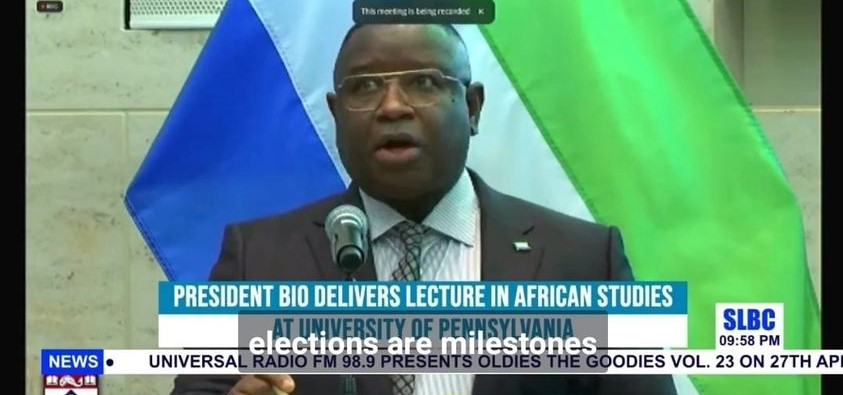
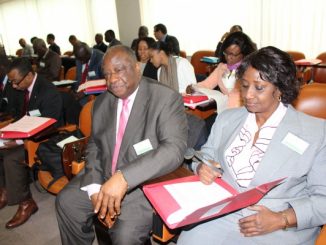
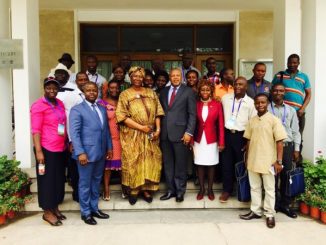
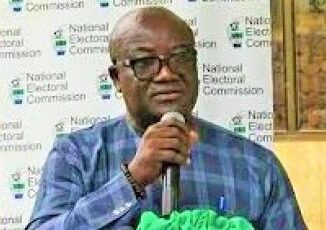
Leave a Reply